Avoid the douploads.net untrusted file hosting/sharing website
Notification SpamAlso Known As: Ads by douploads.net
Get free scan and check if your device is infected.
Remove it nowTo use full-featured product, you have to purchase a license for Combo Cleaner. Seven days free trial available. Combo Cleaner is owned and operated by RCS LT, the parent company of PCRisk.com.
What is douploads[.]net?
douploads[.]net is a rogue website providing file hosting and sharing services, however, it can present visitors with dubious material and/or redirect them to other dubious and possibly malicious sites. This web page displays dubious advertisements and the content hosted on it might be untrusted and even malicious.
To elaborate, these sites are often used to endorse various Potentially Unwanted Applications (PUAs) such as fake anti-virus tools, adware, browser hijackers, etc. Bogus file hosting/sharing websites are also used to proliferate Trojans, ransomware and other malware. Therefore, you are strongly advised against visiting and/or using douploads[.]net.
![douploads[.]net pop-up redirects](/images/stories/screenshots202009/douploads-net-ads-main.jpg)
As mentioned, when douploads[.]net is accessed and/or interaction takes place (e.g. content is clicked), it can redirect to other rogue, sale-based/promotional, compromised, deceptive/scam and malicious websites. Visiting such web pages can lead to a wide variety of problems, and endanger device and user safety.
The same threats are posed by the ads douploads[.]net hosts and delivers. It can issue these ads if browser notifications are enabled. Rogue websites often use notifications to deliver intrusive ad campaigns. When the hosted/delivered advertisements are clicked, they redirect to dangerous sites and some can even stealthily download/install rogue software.
Clicking intrusive ads can trigger them to execute scripts designed to download/install rogue software (e.g. PUAs) without users' consent. These unwanted applications can have various dangerous capabilities in varied combinations. Some PUAs can force-open untrusted/malicious web pages.
Adware-type apps deliver intrusive advertisement campaigns. Other PUAs called browser hijackers make modifications to browser settings and restrict/deny access to them in order promote fake search engines.
The promoted web search tools are usually unable to provide unique results, and so they redirect to (or cause redirection chains ending with) Google, Yahoo, Bing and other legitimate search engines. Furthermore, most PUAs can track data.
They monitor browsing activity (visited URLs, viewed pages, searched queries, etc.) and collect personal information extracted from it (IP addresses, geolocations and other details). This sensitive information is then shared with and/or sold to third parties (potentially, cyber criminals).
In summary, the presence of unwanted software on devices can lead to system infections, financial loss, serious privacy issues and even identity theft.
| Name | Ads by douploads.net |
| Threat Type | Push notifications ads, Unwanted ads, Pop-up ads. |
| Detection Names | CLEAN MX (Malicious), CRDF (Malicious), CyRadar (Malicious), Full List Of Detections (VirusTotal). |
| Serving IP Address | 104.27.191.182 |
| Observed Domains | ftp.douploads[.]net |
| Symptoms | Seeing advertisements not originating from the sites you are browsing. Intrusive pop-up ads. Decreased Internet browsing speed. |
| Distribution Methods | Deceptive pop-up ads, potentially unwanted applications (adware). |
| Damage | Decreased computer performance, browser tracking - privacy issues, possible additional malware infections. |
| Malware Removal (Windows) |
To eliminate possible malware infections, scan your computer with legitimate antivirus software. Our security researchers recommend using Combo Cleaner. Download Combo CleanerTo use full-featured product, you have to purchase a license for Combo Cleaner. 7 days free trial available. Combo Cleaner is owned and operated by RCS LT, the parent company of PCRisk.com. |
Myflixer.to, soap2day.to, 320youtube.com, filez.top, magnetdl.com, limetorrents.info and bc.vc are some examples of other rogue websites. Visiting and/or using these sites can result in serious problems.
These web pages commonly promote dubious and dangerous websites, host harmful advertisements, display and/or contain nonoperational, pirated, illegal and even malicious content.
How did adware install on my computer?
Certain PUAs have "official" download web pages, which are often promoted by deceptive/scam sites. These applications are also distributed via the download/installation set-ups of other software. This deceptive marketing method of packing regular products with unwanted or malicious additions is called "bundling".
Rushing download/installation processes (e.g. ignoring terms, skipping steps and sections, etc.) increases the risk of unintentionally allowing bundled content into the system. When clicked, intrusive advertisements can execute scripts to download/install PUAs without users' permission.
How to avoid installation of potentially unwanted applications
All products should be researched before download/installation and/or purchase. You are advised to use only official and verified download channels. Dubious sources such as unofficial and free file-hosting websites, Peer-to-Peer sharing networks and other third party downloaders offer deceptive and bundled content.
When downloading/installing, read the terms, explore all available options, use the "Custom" or "Advanced" settings and opt-out of supplementary apps, tools, features and other additions. It is also important to exercise caution when browsing. Intrusive ads typically seem legitimate, however, they can redirect to highly dubious pages (e.g. gambling, pornography, adult-dating, etc.).
If you encounter these ads or redirects, check all devices and immediately remove all suspect applications and browser extensions/plug-ins from them. If your computer is already infected with rogue applications, we recommend running a scan with Combo Cleaner Antivirus for Windows to automatically eliminate them.
Appearance example of douploads[.]net website (GIF):
![douploads[.]net website appearance (GIF)](/images/stories/screenshots202009/douploads-net-ads-appearance.gif)
Another appearance example of douploads[.]net website (GIF):
![Appearance variant of douploads[.]net (GIF)](/images/stories/screenshots202009/douploads-net-ads-appearance-notifications.gif)
Instant automatic malware removal:
Manual threat removal might be a lengthy and complicated process that requires advanced IT skills. Combo Cleaner is a professional automatic malware removal tool that is recommended to get rid of malware. Download it by clicking the button below:
DOWNLOAD Combo CleanerBy downloading any software listed on this website you agree to our Privacy Policy and Terms of Use. To use full-featured product, you have to purchase a license for Combo Cleaner. 7 days free trial available. Combo Cleaner is owned and operated by RCS LT, the parent company of PCRisk.com.
Quick menu:
- What is Ads by douploads.net?
- STEP 1. Remove spam notifications from Google Chrome
- STEP 2. Remove spam notifications from Google Chrome (Android)
- STEP 3. Remove spam notifications from Mozilla Firefox
- STEP 4. Remove spam notifications from Microsoft Edge
- STEP 5. Remove spam notifications from Safari (macOS)
Disable unwanted browser notifications:
Video showing how to disable web browser notifications:
 Remove spam notifications from Google Chrome:
Remove spam notifications from Google Chrome:
Click the Menu button (three dots) on the right upper corner of the screen and select "Settings". In the opened window select "Privacy and security", then click on "Site Settings" and choose "Notifications".
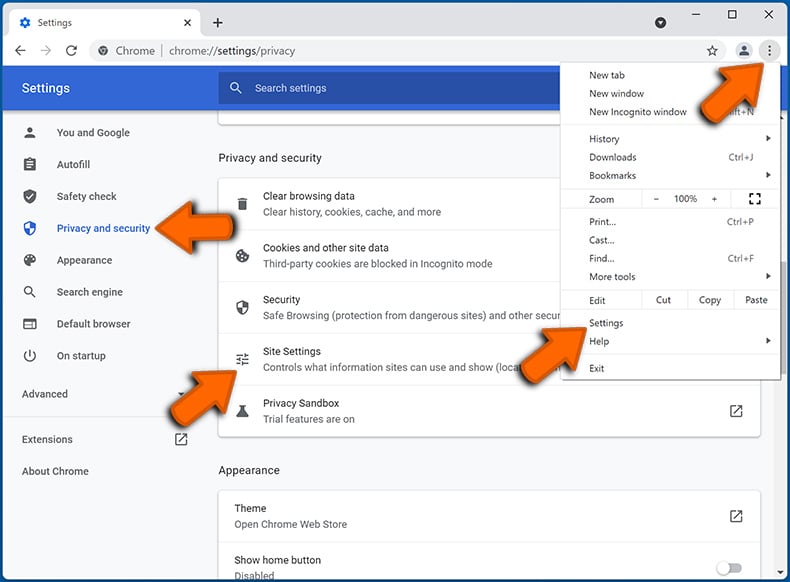
In the "Allowed to send notifications" list search for websites that you want to stop receiving notifications from. Click on the three dots icon near the website URL and click "Block" or "Remove" (if you click "Remove" and visit the malicious site once more, it will ask to enable notifications again).
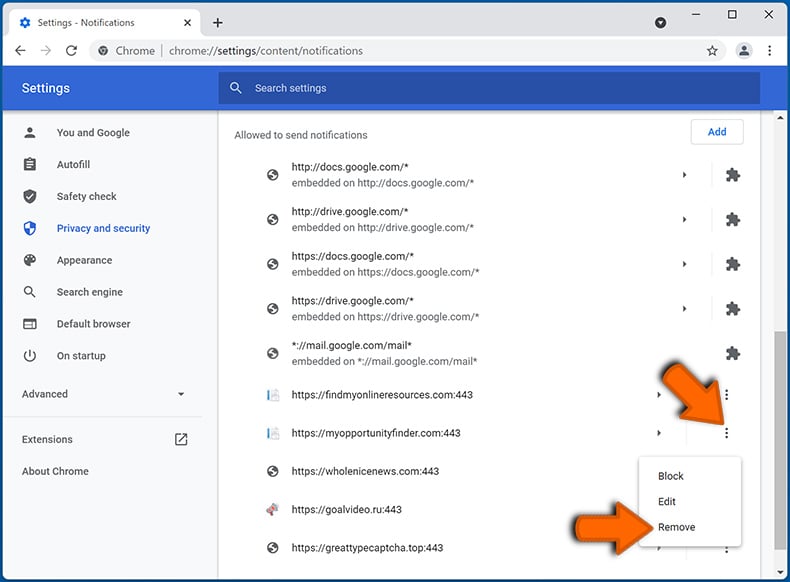
 Remove spam notifications from Google Chrome (Android):
Remove spam notifications from Google Chrome (Android):
Tap the Menu button (three dots) on the right upper corner of the screen and select "Settings". Scroll down, tap on "Site settings" and then "Notifications".
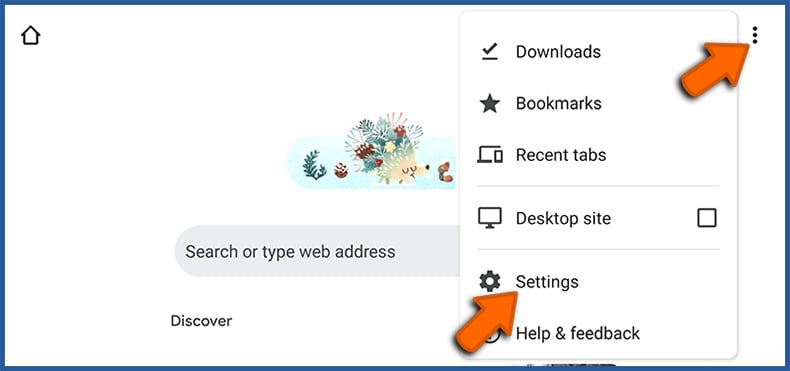
In the opened window, locate all suspicious URLs and tap on them one-by-one. Once the pop-up shows up, select either "Block" or "Remove" (if you tap "Remove" and visit the malicious site once more, it will ask to enable notifications again).
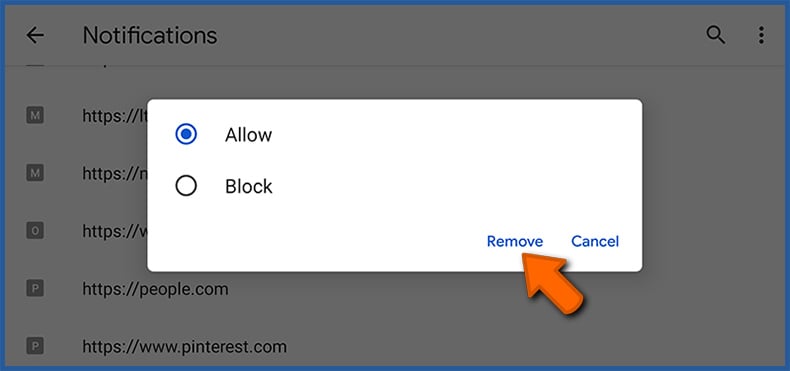
 Remove spam notifications from Mozilla Firefox:
Remove spam notifications from Mozilla Firefox:
Click the Menu button (three bars) on the right upper corner of the screen. Select "Settings" and click on "Privacy & Security" in the toolbar on the left hand side of the screen. Scroll down to the "Permissions" section and click the "Settings" button next to "Notifications".
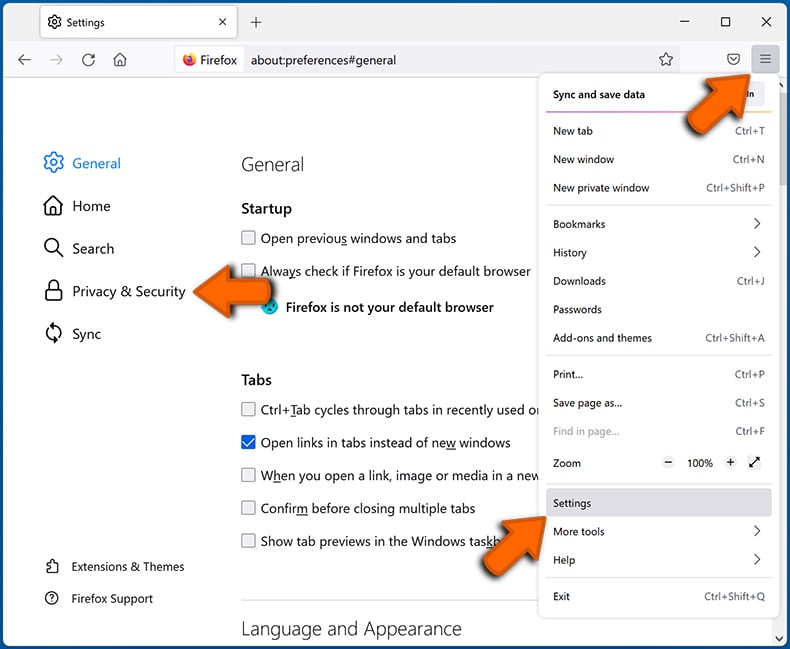
In the opened window, locate all suspicious URLs and block them using the drop-down menu or either remove them by clicking "Remove Website" at the bottom of the window (if you click "Remove Website" and visit the malicious site once more, it will ask to enable notifications again).
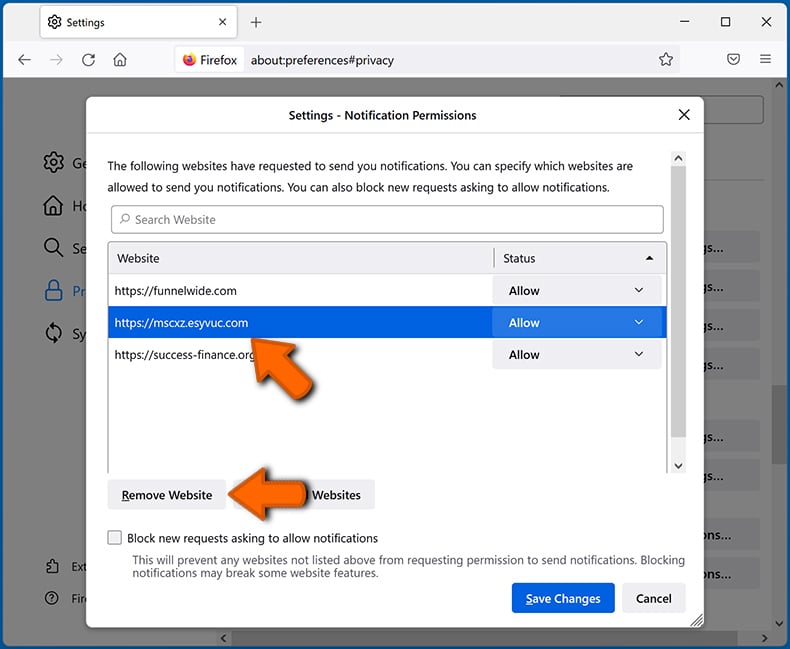
 Remove spam notifications from Microsoft Edge:
Remove spam notifications from Microsoft Edge:
Click the menu button (three dots) on the right upper corner of the Edge window and select "Settings". Click on "Cookies and site permissions" in the toolbar on the left hand side of the screen and select "Notifications".
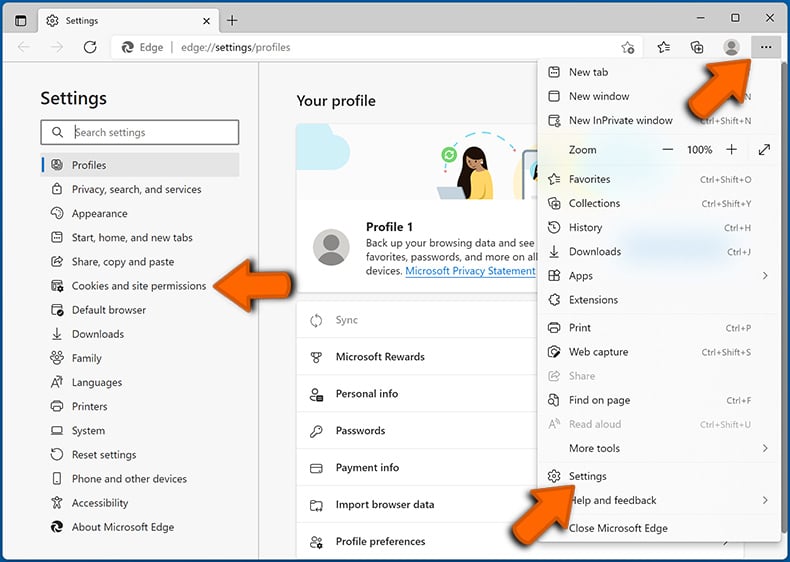
Click three dots on the right hand side of each suspicious URL under "Allow" section and click "Block" or "Remove" (if you click "Remove" and visit the malicious site once more, it will ask to enable notifications again).
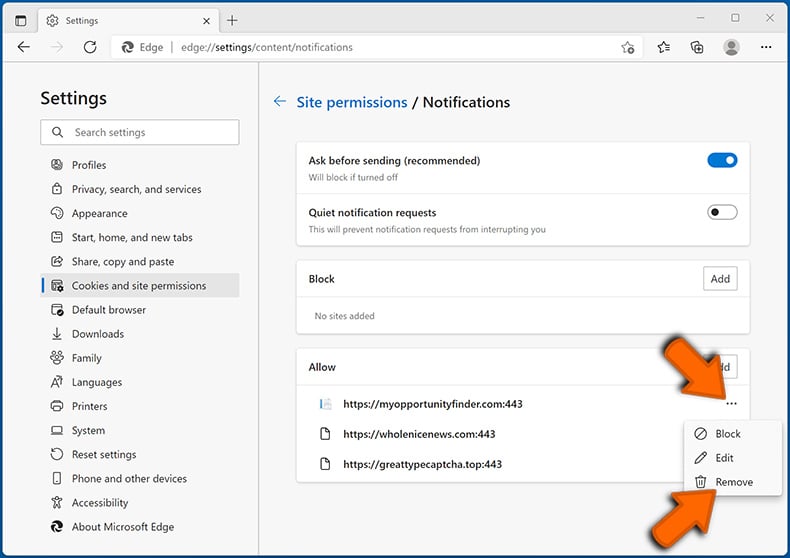
 Remove spam notifications from Safari (macOS):
Remove spam notifications from Safari (macOS):
Click "Safari" button on the left upper corner of the screen and select "Preferences...". Select the "Websites" tab and then select "Notifications" section on the left pane.
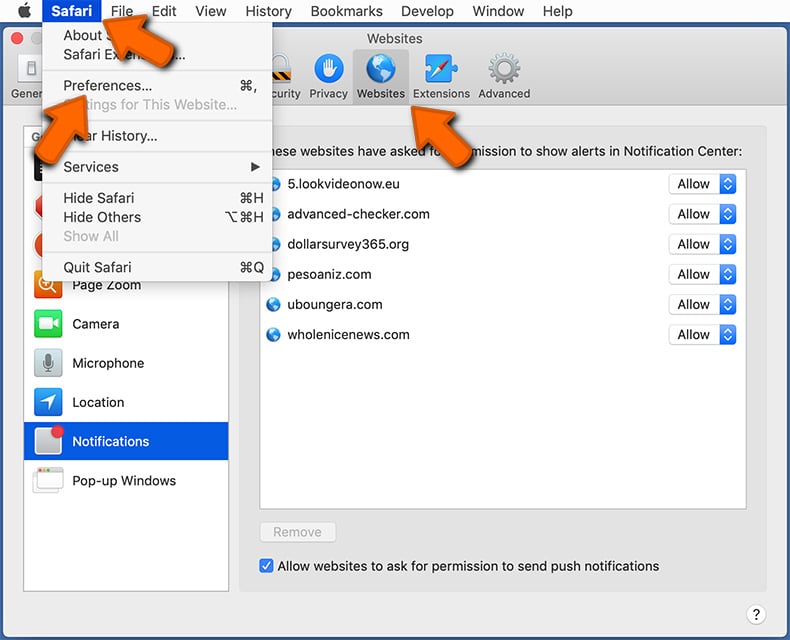
Check for suspicious URLs and apply the "Deny" option using the drop-down menu or either remove them by clicking "Remove" at the bottom of the window (if you click "Remove" and visit the malicious site once more, it will ask to enable notifications again)
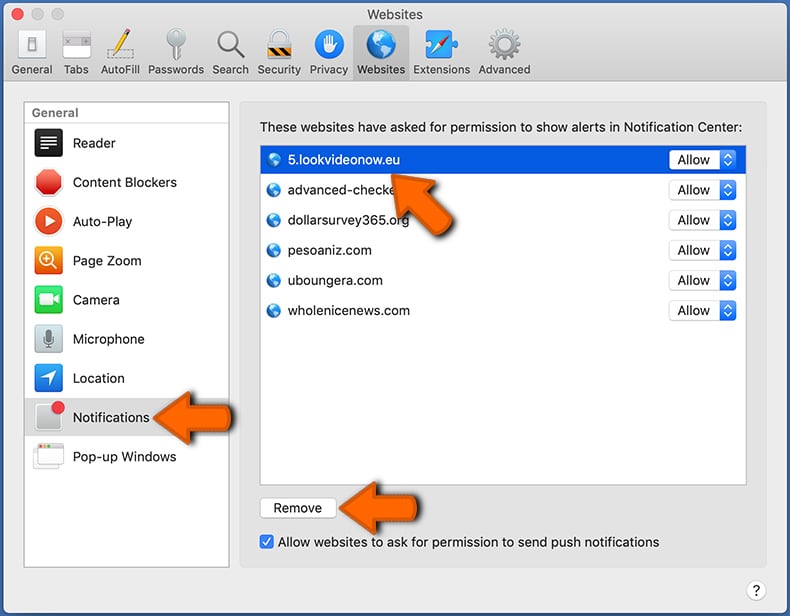
How to avoid browser notification spam?
Internet users should be very skeptical when being asked to allow notifications. While this is a useful feature that allows you to receive timely news from websites you like, deceptive marketers frequently abuse it.
Only allow notifications from websites that you fully trust. For added security - use an anti-malware application with a real-time web browsing monitor to block shady websites that tries to trick you into allowing spam notifications. We recommend using Combo Cleaner Antivirus for Windows.
Share:

Tomas Meskauskas
Expert security researcher, professional malware analyst
I am passionate about computer security and technology. I have an experience of over 10 years working in various companies related to computer technical issue solving and Internet security. I have been working as an author and editor for pcrisk.com since 2010. Follow me on Twitter and LinkedIn to stay informed about the latest online security threats.
PCrisk security portal is brought by a company RCS LT.
Joined forces of security researchers help educate computer users about the latest online security threats. More information about the company RCS LT.
Our malware removal guides are free. However, if you want to support us you can send us a donation.
DonatePCrisk security portal is brought by a company RCS LT.
Joined forces of security researchers help educate computer users about the latest online security threats. More information about the company RCS LT.
Our malware removal guides are free. However, if you want to support us you can send us a donation.
Donate
▼ Show Discussion